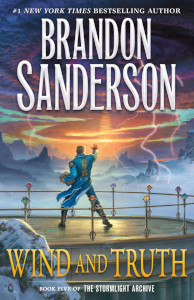
Wind and Truth by Brandon Sanderson.
Highlights
He’d stopped revering people he didn’t know the day Amaram branded him. God or king. If they wanted his respect, they could earn it. — p. 47
“Perhaps the question isn’t ‘What use is art?’” Wit mused. “Perhaps even that simple question misses the point. It’s like asking the use of having hands, or walking upright, or growing hair. Art is part of us, Kaladin. That’s the use; that’s the reason. It exists because on some fundamental level we need it. Art exists to be made.” — p. 62
“You think that kid who starved didn’t want to eat? You think her parents didn’t want to escape the ravages of war badly enough? You think if they’d had more Passion, the cosmere would have saved them? How convenient to believe that people are poor because they didn’t care enough about being rich. That they just didn’t pray hard enough. So convenient to make suffering their own fault, rather than life being unfair and birth mattering more than aptitude. Or storming Passion.” — p. 66
“A virtue is something that is valuable even if it gives you nothing. A virtue persists without payment or compensation. Positive thinking is great. Vital. Useful. But it has to remain so even if it gets you nothing. Belief, truth, honor … if these exist only to get you something, you’ve missed the storming point.” — p. 66
The question isn’t if we’re ready, but if it needs to be done. — p. 245
Those who offer blanket condemnation are fools, for each situation deserves its own consideration, and rarely can you simply apply a saying—even one of mine—to a situation without serious weighing of the context. — p. 338
May you have the courage someday to walk away. And the wisdom to recognize that day when it arrives. — p. 389
Reminders that an idea wasn’t true just because it entered his head. — p. 408
It was unfair that convincing someone depended not on the strength of ideas, but the strength of the arguer. — p. 871
“I’m saying we need to act on the information we have, not the information we think we don’t have.” — p. 994
“It’s bad military discipline, Gezamal,” Adolin said. “You can’t punish soldiers for making good decisions—or sometimes even those who make the wrong ones. You need officers to feel comfortable making decisions. If you muddle that with a fear of repercussions, the result is indecisive leadership. And the result of that is disaster.” — p. 1197
“Listen. Remember. The question is not whether you will love, hurt, dream, and die. It is what you will love, why you will hurt, when you will dream, and how you will die. This is your choice. You cannot pick the destination, only the path.” — p. 1223
Few combatants win on board or battlefield without first having won the fight against their own minds. — p. 1242
“My goal is nothing more than the freedom of mind, body, and will for all. Let them worship how they wish, but let them do so with their eyes open, having all the relevant information.” — p. 1359
I am against dogma of any variety. God, nationality, or philosophy—when you become a slave to it without capacity to change or reconsider, that is the problem. — p. 1359
“So much better to feel,” Renarin said, “than to take the path that leads to only greyness and safe solitude.” — p. 1420
Because when the predetermined answers flee, then the solution comes down to who you are. That’s when we see the mettle of a person. That is art: when untested skill meets unplanned catastrophe. — p. 1692